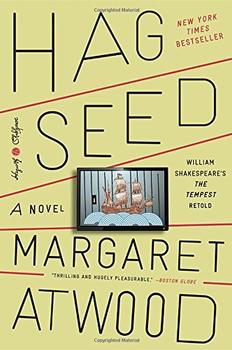Summary | Excerpt | Reviews | Beyond the Book | Read-Alikes | Genres & Themes | Author Bio

Hogarth Shakespeare series
by Margaret AtwoodThis article relates to Hag-Seed
"You taught me language. And my profit on't is, I know how to curse." That's the lament of Caliban, the resident savage of Shakespeare's The Tempest, but it's also the the savvy modern reader's takeaway of Shakespeare's plays. Among the linguistic legacies of Shakespeare, eloquent and eclectic cursing and insults must certainly be included.
The man knew how to cut someone down to size ("Away, you three inch fool!") with a dazzling array of metaphorical maliciousness ("You are now sailed into the north of my ladies opinion, where you will hang like an icicle on a Dutchman's beard.") and poeticized putdowns ("Thou clay-brained guts, thou knotty-pated fool, thou whoreson obscene greasy tallow-catch!")
As Eric Partridge noted in his classic study Shakespeare's Bawdy, impolite situations seemed to bring out a side of Shakespeare that is "broad, ribald, healthily coarse, unsqueamishly natural, and unaffectedly humorous." That blend of coarseness and humor is put to good use in Margaret Atwood's Hag-Seed, as the plot involves prisoners who are performing Shakespeare–but they must agree not to use any curses in prison that don't come from Shakespeare ("Memorize them and then learn how to spell them," the director tells them. "Those will be your special swear words.")
And there's certainly no shortage of ingenious invective from the Barb of Avon. Here's just a sample of some of his celebrated curses and insults:
"Thou bawdy, motley-minded rudesby!"
"Thou brazen, raw-boned canker-blossom!"
"Thou art a sottish, clay-brained nut-hook!"
"Thou art a waggish, horn-mad dogfish!"
"Thou art a hideous, eye-offending, hedge-pig!"
Sometimes the playwright demonstrated in his cursing the brevity that is the soul of wit: "Fie upon it!" "Zounds!" or the catch all "Go to!" At other times, he seemed to absolutely revel in the fulsomeness of his fulminations:
Thou art a base, proud, shallow, beggarly, three-suited, hundred-pound, filthy worsted-stocking knave; a lily-liver'd, action-taking, whoreson, glass-gazing, superserviceable, finical rogue; one-trunk-inheriting slave; one that wouldst be a bawd in way of good service, and art nothing but the composition of a knave, beggar, coward, pandar, and the son and heir of a mungril bitch.— King Lear
It's hard not to love such vile verbal volleying. But then again, as Shakespeare well knew, some people and things are just hard to love: "I do wish thou were a dog, that I might love thee something."
Filed under Books and Authors
![]() This article relates to Hag-Seed.
It first ran in the October 19, 2016
issue of BookBrowse Recommends.
This article relates to Hag-Seed.
It first ran in the October 19, 2016
issue of BookBrowse Recommends.
Your guide toexceptional books
BookBrowse seeks out and recommends the best in contemporary fiction and nonfiction—books that not only engage and entertain but also deepen our understanding of ourselves and the world around us.